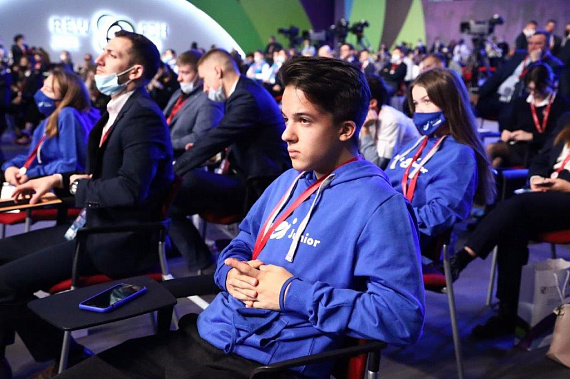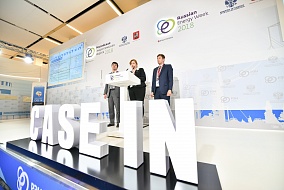“We are Ready to Provide Support and are Open to Initiatives”: Energy Industry Leaders Met with Schoolchildren at REW.Junior

An REW.Junior section, organized
by the Content Foundation, was held as part of Russian Energy Week’s Youth Day.
Gazprom Neft CEO Alexander Dyukov, State Atomic Energy Corporation ROSATOM
Director General Alexey Likhachev, and Chairman of the Board of Directors of
ESN Group Grigory Berezkin spoke to schoolchildren and university students in
an open dialogue.
The speakers answered the young
audience’s questions and described the most promising subject areas for future
specialists and what skills they need to be successful in the energy, oil, and
gas industries.
According to State Atomic Energy Corporation
ROSATOM’s Director General Alexey Likhachev, people in the nuclear energy
sector need to display a cogent and thoughtful approach to their work.
“You are the future heads and
organizers of our energy industry. Atomic energy is a very new industry. No
other energy sector requires as much of a thoughtful, cogent, and incremental
approach. The current step is carrying out the Presidential decision to expand
the share of nuclear energy in the energy balance of our country to 25% by
2045,” said Likhachev.
Gazprom Neft CEO Alexander Dyukov
talked about the kind of specialists that the oil and gas industry needs. The
speaker noted that, most importantly, future professionals must be ready for
“changes in the market situation, be able to swiftly react to those changes,
and have a high level of professional knowledge and skills”.
“The oil and gas sector is one of
the most multifaceted and difficult specialties. It encompasses geological
exploration, extraction, processing, transport, and interactions with chemical
processes and consumers. No other industry can boast of objectives that are as
complex or numerous. Which is why we need a wide range of specialists. We also
rely on digital technologies, so if you are involved in digital technology and
artificial intelligence, we would be glad to have such specialists in our
company,” said Dyukov.
According to Chairman of the
Board of Directors of ESN Group Grigory Berezkin, future specialists must know
how to cooperate: “If ten people out of the group gathered here were to get
together – with your potential, youth, and passion – they could create a
company that would become a good aggregator in our country. We, for our part,
are ready to provide you with support, aid, and guidance,” said Berezkin.
Chairman of the Youth Council for
the Oil and Gas Sector at Russia’s Ministry of Energy Ruslan Fatkhutdinov
explained that events such as REW.Junior can serve as a bridge between
corporations, universities, and schoolchildren.
“The REW.Junior section, held as
part of the Point Junior project, has indicated that companies are open to and
ready for initiatives. The project needs to be developed and expanded to find
out what the youth are interested in. Because not everyone who, for example,
attends an oil and gas university understands what their next steps are and
what professions they can choose from. Territorial and regional conditions must
be considered and accounted for. It is important that young people are
motivated to grow and can see how their careers may develop,” said
Fatkhutdinov.
The REW.Junior section was
organized by the Content Foundation for the Development of Expert and
Analytical Activity, which organized events as part of the Point Junior
discussion and communication platform with the support of Innopraktika and the
Roscongress Foundation.
Point Junior youth tracks were
included in the agendas of the 24th St. Petersburg International Economic Forum
(SPIEF 2021) and the 6th Eastern Economic Forum (EEF 2021). A total of over 250
Russian and foreign school-age children and over 150 global business leaders,
prominent government officials, and experts took part in the events.





